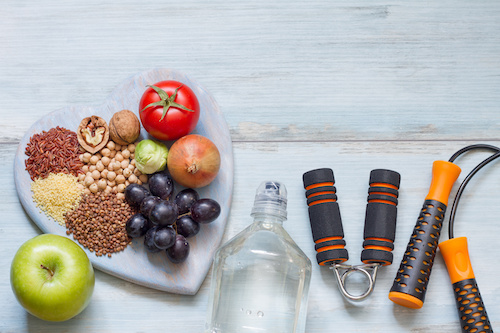
New Brunswick, N.J., February 1, 2023 – Many forms of cancer are preventable. Although risk factors such as age or genetics cannot be changed, other risk factors for cancer including healthy lifestyle choices are within your control. Elisa V. Bandera, MD, PhD and Carolyn J. Heckman, PhD, co-leaders of the Cancer Prevention and Control Research Program at Rutgers Cancer Institute of New Jersey, the state’s only National Cancer Institute (NCI)-Designated Comprehensive Cancer Center, together with RWJBarnabas Health, share their top tips for cancer prevention during National Cancer Prevention Month.
Eat healthy foods, get moving and minimize alcohol consumption. Eating a well-balanced diet, regular physical activity and maintaining a healthy body weight have many health benefits. All three factors can reduce cancer risk and have been linked to better overall health and improved quality of life and prognosis after a cancer diagnosis. American Cancer Society Guideline for Diet and Physical Activity for Cancer Prevention and Nutrition and Physical Activity Guideline for Cancer Survivors suggests adopting a lifestyle pattern that includes eating a diet of whole grains, vegetables, fruit, and beans; minimizing red and processed meat, fast foods and other processed foods high in fat, and sugars; and prioritizing physical activity to maintain a healthy body weight. Additionally, alcohol consumption is not recommended, as it is a carcinogen and has been found to increase risk for many cancers.
Make a plan to stop smoking. According to the National Cancer Institute (NCI), tobacco can increase the risk for many kinds of cancer including lung, mouth, throat, cervical, blood, bladder, esophagus, stomach, pancreatic and kidney cancers. In fact, according to the NCI, cigarette smoking causes about 25 percent of all cancer diagnoses and 30 percent of all cancer deaths in the United States. Avoiding tobacco products and quitting smoking are major steps that can be taken to lower the risk for developing cancer. The Tobacco Dependence Program can assist those interested in quitting: 732-235-8222. There are several treatment options that can help people quit.
Protect your skin from the ultraviolet (UV) rays. Exposure to UV rays can increase the risk of developing skin cancer. The Centers for Disease Control and Prevention (CDC) suggests minimizing midday sun exposure, covering up with long sleeves, pants and a wide-brimmed hat along with applying sunscreen (SPF of at least 30) 30 minutes prior to sun exposure and reapplying every two hours or after sweating or swimming. Additionally, avoid artificial sources of UV exposure like tanning beds and sunlamps.
Make cancer prevention and screening part of your lifestyle. Preventative screening tests can lead to early detection of cancers, some of which, if discovered early, can be successfully treated. These include common cancers such as colorectal, lung, and breast cancers, among others. Resources available through Rutgers Cancer Institute of New Jersey, the state’s leading cancer program, and ScreenNJ describe risk factors and other information that can be useful in speaking to a health care provider about a screening schedule. For more information, visit our Cancer Prevention Resource Center.
Dr. Bandera is also chief of cancer epidemiology and health outcomes and director of the Cancer Prevention and Outcomes Data Support Shared Resource at Rutgers Cancer Institute; and professor of medicine at Rutgers Robert Wood Johnson Medical School and New Jersey Medical School. Dr. Heckman is also a professor of medicine at Rutgers Robert Wood Johnson Medical School. Both are members of the Cancer Health Equity Center of Excellence at Rutgers Cancer Institute.
###
For journalists – contact:
Krista Didzbalis
Media Relations Assistant
732-507-8307
krista.didzbalis@rutgers.edu
For patient appointments/inquiries – contact:
844-CANCERNJ (844-226-2376)

